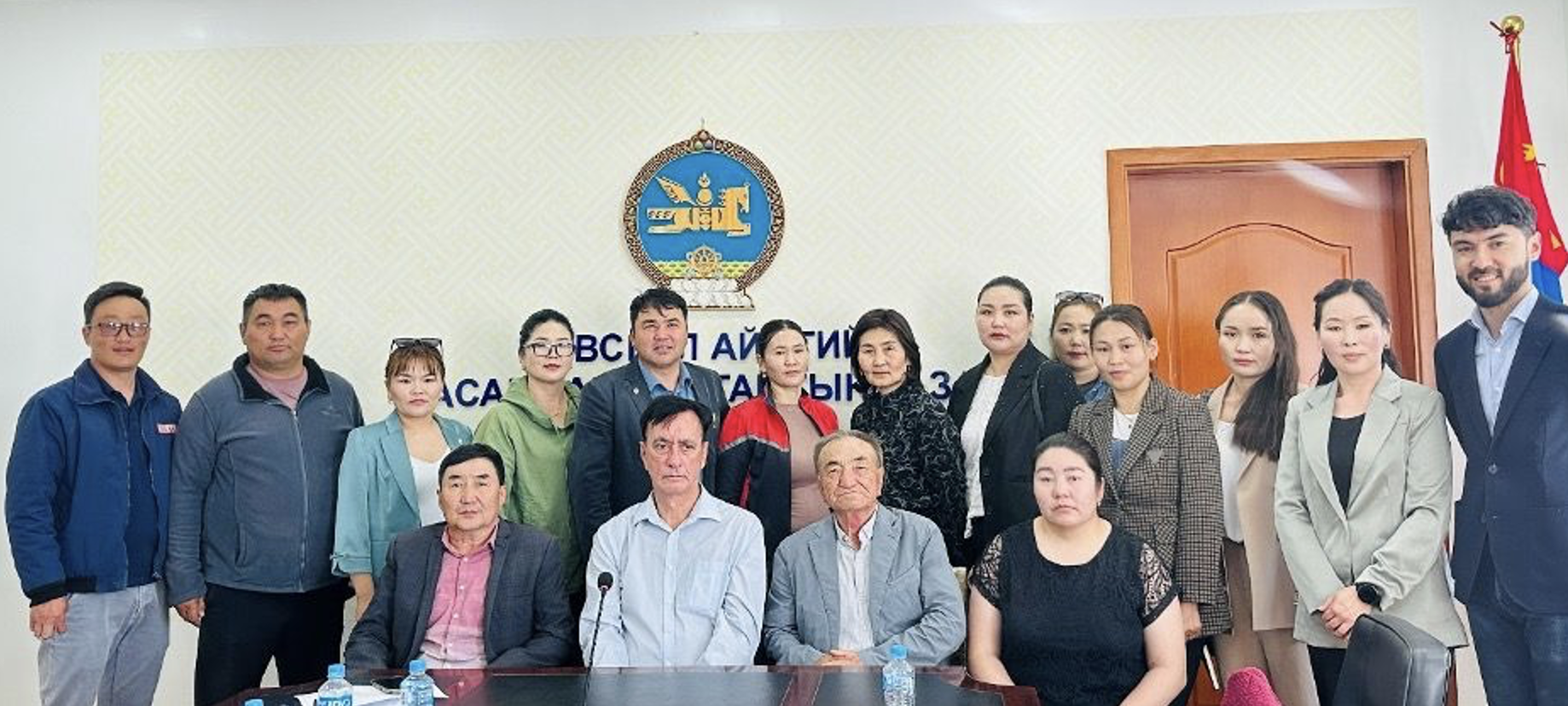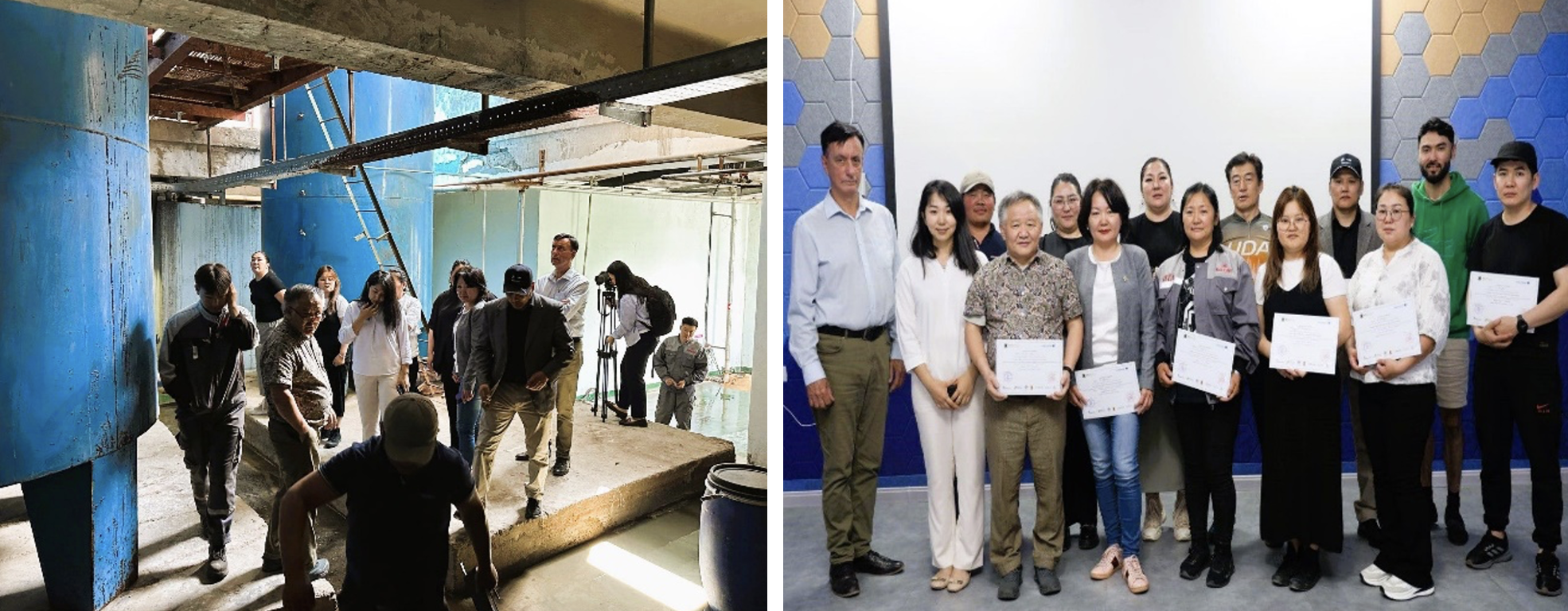
The Mongolian yak leather industry remains a key pillar of the national economy. However, despite its domestic significance, it faces a range of longstanding challenges, including outdated practices, aging equipment, and an underdeveloped supply chain. These constraints have led to a limited yield of high-quality yak hides, restricting Mongolia’s competitiveness in the global leather market and impeding its integration into sustainable value chains.
To address these challenges, the European Union-funded SWITCH-Asia Sustainable Yak Leather (SYL) Project continues to support the transformation of the Mongolian yak leather industry. Through a broad range of targeted activities, the project aims to foster sustainable practices, build technical capacity, and open new market opportunities for Mongolian tanneries and leather producers.
One of the key milestones was the workshop held on 12 March 2024, titled “Review of Tanneries Operations and Elaboration of Plan to Join Leather Working Group”. This event provided Mongolian tanneries with an overview of available certification pathways, including Leather Working Group (LWG) and OEKO-TEX standards. Participants received a detailed roadmap for certification, supported by case studies and Mongolian experiences with LWG. The initiative was based on the LWG Tannery of the Future self-assessment, a valuable learning tool for manufacturers seeking to evaluate and improve their environmental and social performance in preparation for LWG audits.
Complementing these efforts, the project also produced a comprehensive “Guide for Export of Vegetable Tanned Yak Leather Products into Europe” (see Mongolian version here), offering detailed insights into regulatory requirements across various markets. The guide outlines export procedures for semi-processed and finished leather, highlights relevant Mongolian and international legislation, and provides practical guidance on certificates of origin and permissible residues.
In collaboration with the Mongolian Association of Leather Industry (MALI) and consortium leader EUROPEAN PROFILES S.A., an Info Day event was held on 5 June 2024 in Murun. This event aimed to introduce the concept of supporting the Vegetable Tanned Yak Leather Cluster in reducing environmental impacts, improving resource efficiency, and adopting circular economy practices. Attended by 20 participants, including herders, managers, and leather collectors, the event fostered dialogue across the supply chain and strengthened the cluster’s integration into global green value chains.

To further build international trade capacity, the SYL Project organized an Online Workshop on Mongolian Trade Promotion on 17 June 2024. The workshop highlighted trade initiatives aimed at enhancing Mongolia's presence in European markets. Topics included the launch of a Mongolian Trade Center in Freiburg, potential collaboration with the Mongolian Information and Trade Promotion Center in Berlin, and an overview of the Mongolian Export Cluster Network (MECN). With 25 participants, the workshop offered actionable strategies for expanding Mongolia’s trade footprint.
A more technical training was delivered on 19-20 June 2024, focused on process monitoring and control techniques for tannery staff. Held at the Buligar Tannery, the training addressed energy and resource efficiency, the use of in-line detectors, and the integration of monitoring parameters into enterprise resource planning (ERP) systems. Attendees explored the cost implications of current practices and learned how to adopt improved methods for real-time analysis and corrective action.

To further strengthen market access, the SYL Project launched an official brochure featuring the top eight members of the Mongolian Vegetable Tanned Yak Leather Cluster. The brochure introduces key retailers and distributors across Europe and is available in both English and Mongolian. It serves as a strategic resource for Mongolian producers to identify market opportunities and potential business partners.
In support of cleaner production methods, the project also developed a “Guide on the Implementation of Low Energy and Emission Finishing Operations”(see Mongolian version here). This bilingual guide outlines innovative practices to minimize energy use and emissions, aligning with SDG 12: Responsible Consumption and Production. Topics include energy audits, VOC reduction, and best practices such as water-based finishing and the use of bio-based systems.
A major capacity-building effort took place between 4-8 November 2024, with a five-day training on Leather Working Group orientation and sustainable optimization of the vegetable-tanned yak leather value chain. The training equipped participants with tools for traceability, energy and waste management, and chemical safety. It also included sessions on ethical communication and green marketing to avoid greenwashing while aligning with international standards.
Coinciding with this training, the 3rd Project Steering Committee Meeting was held on 5-6 November 2024 in Ulaanbaatar, at the Mongolian National Chamber of Commerce and Industry. Partner organizations reviewed project achievements and implementation plans for the upcoming period. The meeting concluded with field visits to three tanneries in the cluster, offering partners a first-hand understanding of local operations and opportunities for future collaboration.
To support manufacturers in achieving internationally recognized certifications, the SYL Project also produced the “Guidelines for LWG and OEKO-TEX" (see Mongolian version here). Available in English and Mongolian, the guide offers step-by-step instructions for meeting environmental and social standards, enhancing traceability, and reducing resource use.
In addition, a HACCP and ISO Implementation Guide for Mongolian Leather Tanneries was released, providing practical strategies for complying with ISO 9001, 14001, and 45001 standards. Featuring case studies and guidance on safety, efficiency, and sustainability, the guide positions Mongolian tanneries for global competitiveness.


What’s Next?
Looking ahead, the SYL Project is preparing a “Guide on National and International Green Financing Opportunities” for all cluster members. This guide will provide a comprehensive overview of green finance instrumentssuch as grants, concessional loans, and green bonds at both national and international levels. The aim is to equip stakeholders with tools to support sustainable production and climate resilience.
Following the release of the guide, a Workshop with cluster members, investors, and key stakeholders will be held to explore financing solutions, share good practices, and encourage the development of new financial schemes for sustainable production.
Simultaneously, the project is developing an “Action Plan for Joining the Responsible Leather Round Table (RLRT)”. This report will analyze opportunities, requirements, and strategic pathways for Mongolian tanneries to align with global sustainable leather initiatives. It will also explore the benefits and challenges of RLRT membership, tailored specifically to Mongolia’s context.


